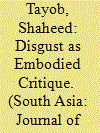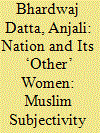| Srl | Item |
| 1 |
ID:
170003


|
|
|
|
|
| Summary/Abstract |
Hindu nationalist discourse articulates a link between the violence of slaughter and the notion of a violent, abject Muslim as the cruel ‘other’. However, for Muslims in Mumbai, the cruelty of slaughter is not inherent, and questions of order and propriety are heavily circumscribed by communal politics. This paper presents moments during Bakri Id (Qurbani) and everyday life when participants evoke or experience disgust. Drawing on a discursive tradition of slaughter, together with everyday observations on infrastructure, order and marginalisation by middle-class Muslims from various walks of life, focuses attention on the way disgust is and is not experienced by Muslims in the city. I argue that these instances of disgust are moments of embodied critique that secure the middle-class Muslim as subject by pointing to the histories of marginalisation, infrastructural neglect and improper religious practice.
|
|
|
|
|
|
|
|
|
|
|
|
|
|
|
|
| 2 |
ID:
178871


|
|
|
|
|
| Summary/Abstract |
Partition produced newer anxieties for Delhi’s Muslims as they became subject to the everyday violence of both state and society, exacerbated by the rise of Hindu nationalism and the organised demarcation of Muslim-dominated areas as ‘exclusionary’ and ‘contested’ zones. While the city was fraught with violent conflicts and exclusionary politics, gender was also being redefined and renegotiated. This article will query the particular lived experience and embodied agency of Muslim women in order to study gender and space within the context of social, cultural, economic and political changes after Partition. It will explore the ways in which women exercised agency and claimed space and belonging in everyday negotiations and strategies for survival, thereby contributing to family income and small capitalism in the Old City. It will study their diverse experiences which were shaped by their social location and challenged by the political, religious, economic and social processes that impinged upon their lives. Rather than seeing them as passive subjects of history, it foregrounds Muslim women’s navigation of state, community and the household in independent India.
|
|
|
|
|
|
|
|
|
|
|
|
|
|
|
|